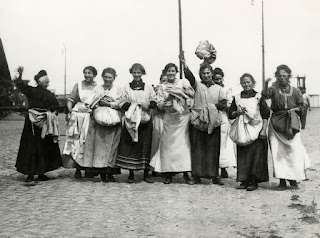Mercedes Azpilicueta, Launch publication ‘Onze Roeping, On Joyful Militancy’

Join us for the launch of the publication Onze Roeping, on Joyful Militancy by Mercedes Azipilicueta.
In 2019 ROZENSTRAAT- a rose is a rose is a rose invited Mercedes Azpilicueta for a research project around the Aardappeloproer (2017), one of the best known social uprisings in Amsterdam. It was the start of Onze Roeping, On Joyful Militancy, a performative walk in the public space of Jordaan with a focus on the Potato Riots in 1917. Please scroll down for more information about the walks.
The publication consists of the documentation of the performative walks and texts by Anik Fournier and Mieke Krijger that give an insight view about the project.
Credits publication:
Texts: Mieke Krijger, Anik Fournier
Design: Laura Pappa
Translations: Laura Kneebone and Esther Mugambi
Coordination: Angeliki Tzortzakaki
Commissioned by: ROZENSTRAAT- a rose is a rose is a rose
More information about Onze Roeping, On Joyful Militancy:
Women have fought several times in history for the rights of the working class, despite the engendered assumption that they had no contribution to society besides their capacity -and often the obligation- to procreate. During critical situations such as wars and famines where the scarce resources were distributed to the ‘productive’ part of the population, the Jordanese women stood up collectively and plundered food supplies in order to feed their families. The resulting jolt was an encouraging example of intersectional solidarity and care for the part of the population facing repression and lack of social justice.
With a focus on the Potato Riots (Aardappeloproer) in
Onze Roeping, on Joyful Militancy was initiated by Mercedes Azpilicueta and ROZENSTRAAT-curator Sjoerd Kloosterhuis and is supported Amsterdam Fonds voor de Kunst and Stichting Stokroos.